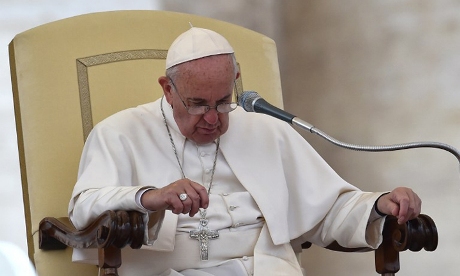Pope Francis has asked for forgiveness for recent scandals that have taken place in Rome and in the Vatican.
This statement came during his general audience in St Peter’s Square on Wednesday.
The Pope said: “Before beginning the catechesis, I would like to ask forgiveness in the name of the Church for the scandals that have happened in this last period both in Rome and at the Vatican. I ask forgiveness.”
The Pope’s apology came at the beginning of a catechetical reflection that was focused on caring for children.
There has been speculation as to which specific scandals the Pope was apologising for.
Vatican spokesman Fr Federico Lombardi, SJ, Vatican told reporters later, “if the Pope uses a broad and general formula, that is what he intended”.
Fr Lombardi said Francis wanted to reach out to ordinary people who are “disturbed or pained” when they read about scandals caused by “the Church or men of the Church”.
Vatican commentator John Thavis wrote in his blog that there were several scandals for the Pope to choose from.
- “The gay official of the Vatican’s doctrinal congregation who recently came out with his partner, saying the climate at his workplace was homophobic?”
- “Accusations of sexual impropriety made by a group of Catholics against priests and an official of the Carmelite religious order in Rome? “
- “The resignation of Rome’s leftist mayor, Ignazio Marino, following press reports that the Pope was unhappy with the mayor’s action on a number of issues?”
- “The accusations of sexual abuse against a Vatican diplomat, who was found dead in his Vatican residence in late August before he could stand trial?”
- “Or this week’s leak of a ‘Letter of 13’ cardinals to the Pope, contesting the direction and methods of the current synod of bishops on the family, which was followed by a series of confusing denials and clarifications?”
Thavis also said that the Pope’s subsequent references to the care of children could suggest that it was a reference to clerical sexual abuse.
But he added that there is also growing concern at the return of the “Vatileaks” syndrome that helped convince Pope Benedict XVI to resign in 2013.
Sources
Additional readingNews category: World.




